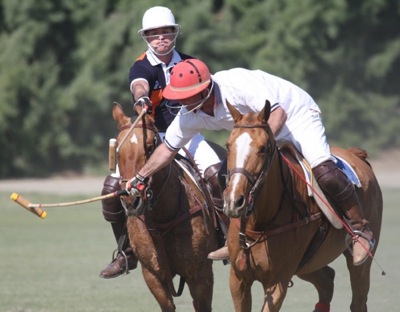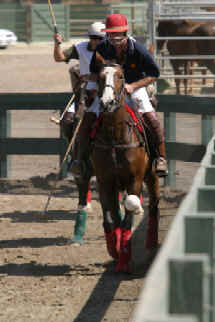Welcome to the
Orange County Polo Club!
714-791-8369
Welcome to our new home in COTO DE CAZA! The Spring/Summer season is in full swing; CLUB CHUKKA THURSDAY AT 6:00PM; SATURDAY AND SUNDAY AT 10:00AM! FOR INQUIRIES ABOUT LESSONS AND JOINING THE OC POLO CLUB CONTACT HEATHER! STAY TUNE FOR OUR NEW REVAMPED WEB SITE TO BE READY VERY SOON!
2009 Desert Series II: GPL and Friends in
Indio

Twelve GPL members took to the field at the Desert Training
Series II on March 7th and 8th, 2009 – with many of the same players returning
for this second of three series. As before, the morning started with a “chalk
talk” session – this week’s topic: “Effectively Riding Off An Opponent”...click
here for the Winter Training Series II story and photos
Posted date:
3/23/2009 From the Orange County Business Journal
Horsing Around
Local Execs Bringing OC Polo Club
to Coto By Sherri Cruz
Orange County Business Journal Staff

|
|
Arena
polo: described as hockey on horseback |
David Schuberth
wasn’t expecting polo lessons from his daughter for
his 49th birthday. Now seven years later, he doesn’t
expect to stop playing any time soon. Schuberth,
owner of Point West Financial Inc., a small mortgage
company based in Huntington Beach, plays arena
polo—a game played on horses with a mallet, similar
to a hockey stick, and a leather ball the size of a
grapefruit.
Arena polo is played in a dirt corral about the size
of an ice hockey ring, as opposed to the classy,
grass-field matches portrayed in movies. Three play
against three with two umpires on horseback.
“It’s not hoity-toity polo,” Schuberth said. Players
are more likely to crack open a beer after the game
than pop open a bottle of sparkling wine.
For three years, polo players in Orange County have
been without a local arena to play. The Orange
County Polo Club started in Anaheim in the 1980s and
moved to Huntington Beach for about 15 years, before
moving to the former El Toro Marine base. The club,
which is as much a social gathering as a sport, was
forced to move again after the base was closed and
cleared to make way for the Great Park.
Many players have kept their horses in Indio, where
they sporadically play at nearby clubs.
“That’s no way to build a club,” said Denny Geiler,
owner of Newport Beach-based SoCal Self Storage and
cofounder of the OC Polo Club.
Coto Arena
Geiler, who describes himself as a “good amateur”
player, is paying to build a new arena at the Coto
de Caza Equestrian Center. The project should open
in May.
Geiler declined to say how much it would
cost. The arena has been three years in the works.
Though the area is zoned for horses, there were a
number of obstacles,
including county permitting and
convincing Coto residents that the polo field
wouldn’t be disruptive.
The arena should help boost club membership. Geiler
said
he’s already got a list of Coto residents
interested in joining in addition to club members
who are excited to move their horses back from the
Inland Empire.
At the height of its membership, the OC Polo Club had about 20 members, typical for a
polo club. Today, it has about half of that. Members
pay an annual
$1,500 membership fee.
The club will pay a monthly maintenance fee to the
equestrian center. Members also pay to board their
horses, which will allow the center
to make
improvements to the property. The center has stables
for about 300 horses. Both residents from inside Coto and outside the gated community keep
horses at
the center.
High Costs
Keeping a horse is relatively expensive. Horse care
fees include those for food, vitamins, veterinary
services and boarding and exercising the animal.
Horse
upkeep can cost upward of $1,200 a month. “A
lot of people are excited to see (the arena) go in,”
said Robin Borders, co-owner of Cinnabar Equestrian
Operations
of Trabuco Canyon. She and her business
partner Ozzy Gonzalez manage the 32-acre property
owned by Silver Bronze Corp., also of Trabuco
Canyon. Not all in
Coto were excited about the polo
club at first, Geiler said, largely because they
weren’t familiar with polo arenas. Some people
thought there would be a lot
of traffic, nighttime
lights and noisy people watching the game in giant
stands. Geiler spent time meeting the residents of Coto, quelling their worries. “We
just want to get
it built and be quiet and be good neighbors,” he
said. That family-oriented attitude is what helped
bring the club in and what keeps it running.
Heather
Schuberth, Dave Schuberth’s daughter, runs the club
and gives polo lessons. She also plays polo with her
father. Cindy Schuberth, Heather’s mom,
is terrified
of horses, but she still participates. “She’s the
official timer,” Heather said.
Birthday Gift
Denny Geiler got into polo from a 40th birthday gift
in the 1980s, right about the time he was
transitioning from being a will and trust attorney
into the self
storage business, which now helps fund
his hobby. His daughter, Shelley Geiler, who started
in horse sports as a young girl, also plays arena
polo. Geiler knew
he was hooked when he found that
polo was something he could do with his daughter,
who was a teen when he started playing. “We were in
this game and
she’s in front of me and we’re going
down the field and I have the ball and Shelley turns
around and yells to me: ‘Hit it to me dad,’” he
said. “And at the point
I knew I was going to play
polo for the rest of my life,” he said. Besides
playing, most members help operate the club. “We
have one guy who likes to
barbecue,” Geiler said, so
he’s in charge of barbecues. The club has a member
bookkeeper. Eric Munk, marketing director for a
large corporation, helps promote
the club. Munk
signed up for polo lessons in 2003 although he had
no prior horse riding experience and was hooked.
Players need an adventurous bone because
horses get
up to 35 miles per hour and there is some physical
contact, he said. “It is a little bit like hockey on
horseback,” he said. “The true athletes out on
the
polo field are the horses.”
The Game
Players get to recognize other players’ horses.
“When Denny is on a certain horse, you now he’s
going to be a formidable force,” Munk said.
Polo involves
teamwork between the player and his or
her teammates and the player and his or her horse.
“It’s teamwork between you and your horse,” Geiler
said. “If you
don’t communicate with your horse, the
horse isn’t going to get you to the ball. The horses
learn the game and they love to play.” People who
play polo often
talk of being addicted to the sport.
“You’ve got some speed and you’ve got some danger,”
Geiler said. Typically, people start playing polo
when they’re older
because it’s an expensive hobby
with polo ponies costing $3,000 to $12,000 and
hunter jumper horses costing more than $50,000.
Schuberth, who in 2008 had his worst year in 25
years in the mortgage
business, didn’t play most of
last year. He “turned out” his three horses for the
year. Usually a horse is turned out to roam a
pasture for about two
months during the year to
rest. But he expects to be back on the dirt. “It’s a
blast. It’s like nothing I’ve ever done before,”
Schuberth said. “I never
thought I’d be doing it at
my age or ever at all.”
|
|
|

Polo on a boot string
The absolute essentials for
entering the game of Polo
Article by Peter J. Rizzo reprinted
courtesy of POLO Players' Edition magazine
Not everyone who desires to play
polo can go out and buy a trailer load of well-made ponies and begin competing
with a couple of 10-goal players in the 26-goal U.S. Open Championship.
For some, polo may seem like a great idea until it starts costing money.
Where does the eager polo novice start? The first thing any beginning
player needs is...full story














